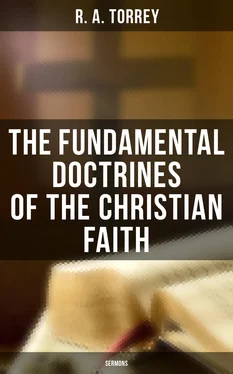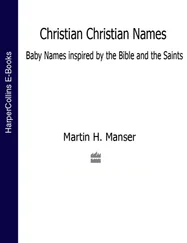R. A. Torrey.
I
Inspiration, or to What Extent Is the Bible Inspired of God?
Table of Contents
"For no prophecy ever came by the will of man, but men spake from God, being moved by the Holy Spirit."—2 Pet. 1:21.
"All Scripture is given by inspiration of God, and is profitable for doctrine, for reproof, for correction, for instruction in righteousness; that the man of God may be perfect, thoroughly furnished unto all good works."—2 Tim. 3:16, 17.
Our subject this morning is "The Inspiration of the Bible, or to What Extent Is the Bible Inspired of God?" The subject is of vital and fundamental importance. If we can make it clear that the writers of the various books of the Bible were inspired of God in a sense that no other men were ever inspired of God, that they were so gifted and taught and led and governed by the Holy Spirit in their utterances as recorded in the Bible, that they taught the truth and nothing but the truth, that their teachings were absolutely without error,—then we have in the Bible a court of final appeal and of infallible wisdom to which we can go to settle every question of doctrine or duty. But if the writers of the Bible were "inspired" only in the vague and uncertain sense that Shakespeare, Browning and many other men of genius were inspired, only inspired to the extent that their minds were made more keen to see the truth than ordinary men, but still only in such a way that they made mistakes, or chose the wrong word to express their thought, so that we must recast their thought by discovering, if we may, what the inspired thought back of the uninspired words was, then we are all at sea, in hopeless confusion, so that each generation must settle for itself what the Holy Spirit meant to say through the blundering reporters; and it is absolutely certain that no generation can determine with anything approximating accuracy what the Spirit meant, and so no generation can arrive at the truth, but simply promulgate blunders for the next and wiser generation to correct, to be corrected in turn by the next generation that follows it. Thank God that this latter subtle but popular doctrine can be proven to be utterly untrue!
There is great need of crystal clear teaching on this subject, because our colleges and seminaries and pulpits and Sunday schools and religious papers are full of teaching that is vague, inaccurate, misleading, un-Scriptural, and oftentimes grossly false. There are many in these days who say "I believe that the Bible is inspired" when by "inspired" they do not mean at all what you understand or what the mighty men of faith in the past meant by "inspired." They often say that they "believe the Bible is the Word of God," when at the same time they believe it is full of errors.
Now the Bible is as clear as crystal in its teachings and claims regarding itself, and either those claims are true, or else the Bible is the biggest fraud in all the literature of the human race. The position held by so many to-day, that the Bible is a good book, perhaps the best book in the world, but at the same time it is full of errors that must be corrected by the higher wisdom of our day, is utterly illogical and absolutely ridiculous. If the Bible is not what it claims to be, it is a fraud—an outrageous fraud.
What does the Bible teach and claim concerning itself? What does it teach and claim regarding the fact and extent of its own inspiration?
I. THE WORK OF THE HOLY SPIRIT IN APOSTLES AND PROPHETS DIFFERENT IN CHARACTER FROM HIS WORK IN ALL OTHER PERSONS
Table of Contents
The first thing that the Bible teaches on this point and claims for itself is, that the work of the Holy Spirit in apostles and prophets, in the various human authors of the different books of the Bible, differs from His work in other men, even in other believers in Christ . It teaches that the Holy Spirit imparts to apostles and prophets an especial gift for an especial purpose. We find this clearly taught in 1 Cor. 12:4, 8-11, 28, 29, where we read, " Now there are diversities of gifts, but the same Spirit. . . . (8) for to one is given through the Spirit the word of wisdom; and to another the word of knowledge, according to the same Spirit; (9) to another faith, in the same Spirit; and to another gifts of healing, in the same Spirit; (10) and to another workings of miracles (powers); and to another prophecy; and to another discerning of spirits; to another divers kinds of tongues, and to another the interpretation of tongues; (11) but all these worketh the one and the same Spirit, dividing to each one severally even as He will. . . . (28) And God hath set some in the church, first apostles, secondly prophets, thirdly teachers, then miracles, then gifts of healings, helps, governments, divers kinds of tongues. (29) Are all apostles? are all prophets? are all teachers? are all workers of miracles?" This chapter is the fullest and clearest chapter in the Bible on the subject of the various gifts of the Holy Spirit. It is the classical chapter on the whole subject, and the teaching of these verses is as plain as language can make it, and it states in terms, the meaning of which is unmistakable, that the gift bestowed on apostles and prophets differed in kind from the gifts bestowed on other believers, even though those believers were filled with the Holy Spirit. Not only did the work of the Holy Spirit in the apostles and prophets differ from His work in men of genius, but even from His work in other believers. These verses make it as plain as day that the doctrine which has become so common and so popular in our day, that the work of the Holy Spirit in preachers and teachers and in ordinary believers, illuminating them and guiding them into the truth and into the understanding of the Word of God, is the same in kind and differs only in degree from the work of the Holy Spirit in Apostles and Prophets is thoroughly unscriptural and untrue. This doctrine overlooks what is here so clearly stated and so carefully elucidated, that while there is "the same Spirit" "there are diversities of gifts" "diversities of ministrations," "diversities of workings" (1 Cor. 12:406 R. V.) and that not all are Prophets or Apostles. (1 Cor. 12:29.)
Those who desire to minimise the difference between the work of the Holy Spirit in Apostles and Prophets, and His work in other men, often refer to the fact that the Bible itself says that Bezaleel, the architect of the tabernacle, was to be "filled with the Spirit of God, in wisdom, and in understanding, and in knowledge, and in all manner of workmanship," "to devise the work of the tabernacle"(Ex. 31:1-11), as a proof that the inspiration of the Prophet does not differ in kind from the inspiration of the artist or the architect. This argument at first glance seems plausible, but when we bear in mind the facts about the tabernacle, especially the fact that the tabernacle was to be built after the pattern shown to Moses in the mount (Ex. 25:8, 9, 40) and that therefore it was itself a revelation from God, a prophecy, a setting forth of the truth of God, the argument loses all its force. The tabernacle was the Word of God done into wood, gold, silver, brass, cloth, skin, etc., just as truly the Word of God and the revealing of God's truth as if the truth were printed on a page. So, of course, Bezaleel needed to be inspired, he was a prophet, a prophet who uttered his prophecies in the details of the tabernacle. There is much reasoning about inspiration to-day that appear at first sight very learned, but that will not bear much scrutiny or candid comparison with the teachings of the Word of God. There is nothing in the Bible more inspired than the tabernacle, and if the destructive critics would study the tabernacle more carefully and thoroughly they would be led to give up their ingenious but untenable theories, not only about the construction of the tabernacle, but about many other things as well. I have never heard or known of a single destructive critic who had ever given a thorough study to the real meaning of the tabernacle in all its parts, or who had any considerable understanding of the types of Scripture. I have challenged the critics in the University centres of England, Ireland and Scotland to name one single destructive critic who had ever made any thorough study of the types, and no one has ever attempted to even suggest one.
Читать дальше












